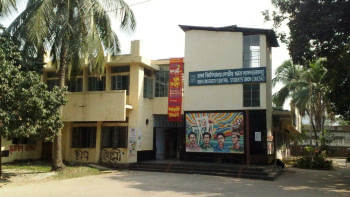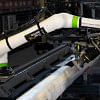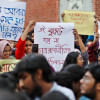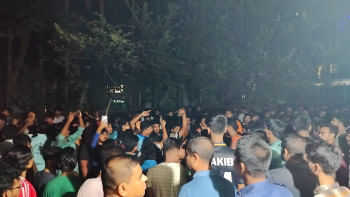Why are BSc and diploma engineers at war?

In a chance meeting with a senior police officer who graduated from BUET, I asked the obvious question: how did he feel about the recent police action on the students from his alma mater? He candidly said he felt terrible, especially because the student with gagged mouth was from his department. Police had a duty to maintain order and prevent the procession from reaching the chief adviser's official residence. While brows can be raised as to why excessive force was used to disperse the students, a similar question can be asked: why did inarguably the most meritorious students of the country waylaid the capital's Shahbagh crossing for two consecutive days? Shouldn't we expect our future professionals to be more accountable?
The question bothered me while I tried to avoid the traffic congestion created by the protest. As a member of the Dhaka University community, I am both a victim of and witness to the chronic pain of commuters and hospital goers at Shahbagh. On Tuesday, when the engineering students started blocking the road, I turned to both my GPS and the Traffic Alert group on Facebook to find an alternative route. There was a warning post by a BUET student, "Don't you dare bring your 'civic' [shushil] self! How dare you threaten 'knifing' one of our friends…?" The old wound between BSc engineers and diploma engineers has been reopened. The interim government has formed two separate committees to listen to the demands of both sides. One can't help but ask: why has this age-old wound been left untreated for so long?
I am sure both parties, BSc and diploma engineers, have discussed their problem in multiple forums. At the heart of the dispute lies the rigid job structure in the public sector, where Grade 9 (assistant engineer) positions are largely for BSc graduates and Grade 10 (sub-assistant engineer) positions are exclusively reserved for diploma holders. One of the primary demands of BSc engineers is the opportunity to compete for Grade 10 positions. As the tension erupted, it soon occurred to me that the debate is not just about recruitment rules; it is about the hierarchical mindset that permeates our education and employment systems.
There is another underlying issue: a serious scarcity of professional jobs and a mismatch between higher education and the labour market demands. Hence, a BSc engineer vies to become a foreign service cadre as well as a technician. However, BSc engineers cannot escape the societal obsession with hierarchy over function. The debate primarily revolves around the title of "engineer" and the corresponding pay grade. The solution must come through the way the country structures opportunity, values technical skills, and employs its most talented graduates.
The manner in which some protesting students confronted the police members shows a dismissive mindset. "Can you spell BUET? Do you know what BUET means?" one student was heard saying. Some of them even explained the difference between university-trained engineers as the "problem solvers and designers" while the diploma graduates as the "technicians." The pecking order in which one designs or supervises while the other executes or carries out instructions is informed by an outdated and ingrained hierarchy that feeds into the Grade 9 versus Grade 10 divide.
The hierarchy, however, is dented when the brightest students in the country, who entered the engineering universities through highly competitive examinations, find that the number of high-level, innovation-driven positions is shockingly low. The dream with which they start their academic journey, hoping to contribute to the country's infrastructural, industrial and technological transformations, soon evaporates. They see that their country thrives on the service sector, while the technical sector is dominated by outsourced companies and donors where they have little or no access. The absence of sufficient opportunities is prompting the university-trained engineers to look "downward," eyeing the posts that were not designed for them.
This doesn't imply that these graduates lack ambition; rather, their aspirations have reached a stalemate. With a lack of adequate employment, a significant number of BSc engineers, especially from BUET and other leading institutions, seek opportunities abroad. This situation represents a crucial loss of national investment. Our public education system that relies solely on government funding spends millions in producing a graduate. Yet, the return on this investment leaks out of the country when graduates leave for better opportunities. In most cases, the white-collared jobs relocate with their families, severing their ties with home. Conversely, the ones who stay back home discover themselves in jobs unrelated to their training. It is not surprising that many BUET graduates end up working in customs, police, or the civil service general cadre. The country's taxpayers have every right to ask why their money is being spent to train engineers who are ending up in professions that have nothing to do with engineering.
The fierce resistance of diploma engineers to protect Grade 10 is because they see these posts as their main pathway to social mobility. A manufactured conflict pits these groups against each other. The real adversary is the narrow pipeline of opportunities. The government cannot simply shift the blame to their predecessors because they came with an agenda of reform. Their failure to form an education reform commission is a sign of gross negligence. The ongoing debate is a by-product of that negligence. Education reform should have addressed the hierarchical mindset that confuses qualification with function. The government must learn from lessons abroad where there is a clear demarcation between professional engineers and technologists. It must define an educational pathway with meaningful roles, outlining opportunities for advancement within its track. The title "engineer" has become a matter of prestige rather than professional definition.
The other body that has a role to play in resolving this crisis is the Public Service Commission. They need to clarify entry qualifications for grades 9 and 10 in line with international standards. To facilitate in-service career mobility, bridging programmes with examinations should be established to enable diploma engineers to upgrade to BSc equivalence if they choose to do so, thereby ensuring merit-based mobility instead of relying on political quotas. We can fill higher posts through transparent and competitive examinations, eliminating the need for institutional pedigree as an automatic qualification. However, we can only resolve these issues if we increase the number of professional engineering jobs. The solution will require emphasis on industrialisation, infrastructure expansion, and investment in research and development. Unless more jobs are created at the top, the conflict will continue at the bottom.
Dr Shamsad Mortuza is professor of English at Dhaka University.
Views expressed in this article are the author's own.
Follow The Daily Star Opinion on Facebook for the latest opinions, commentaries and analyses by experts and professionals. To contribute your article or letter to The Daily Star Opinion, see our guidelines for submission.

 For all latest news, follow The Daily Star's Google News channel.
For all latest news, follow The Daily Star's Google News channel. 










Comments